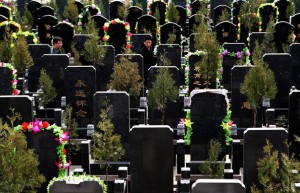 Like anything else, it turns out the way we respond to our mortality is influenced by our culture. A new study in Psychological Science reveals the differences between European Americans and Asian Americans in the way they react to their own mortality. The study came to the conclusion that European Americans tend to get worried and try to protect their sense of self, while Asian Americans on the other hand are much more likely to reach out to others.
Like anything else, it turns out the way we respond to our mortality is influenced by our culture. A new study in Psychological Science reveals the differences between European Americans and Asian Americans in the way they react to their own mortality. The study came to the conclusion that European Americans tend to get worried and try to protect their sense of self, while Asian Americans on the other hand are much more likely to reach out to others.
I read the description of the study, and somehow I didn’t come to the same conclusion on how Asian Americans react to mortality. For example, in one test, they asked the participants to think about either their own death or dental pain (the control group), and then asked the participants to take a survey on their attitudes towards prostitution. When asked to think about their own mortality, European Americans were much harsher on punishment issues on prostitution, while Asian Americans reacted the opposite and tended to be kinder (while the Asian American control group was more conservative).
The explanation provided by the study is that European Americans protect their sense of self by putting down others who aren’t like them. I can sort of buy that explanation, but the explanation about Asian Americans reaching out to others in the face of death didn’t seem to fit.
While I agree Asians Americans are much more family oriented, and the self isn’t as important (I once wrote “I tell my friends that in American culture it’s duty to God, Country, Self, and then Others, but in Chinese culture, it’s Family, God, Country, Others and then Self, and sometimes I think Self doesn’t exist in Chinese culture”), I tend to believe that Asian Americans were gentler and more kind in their attitudes more out of the general belief in a kind of karma that many Asian Americans hold. When you believe you’re going to die (or think about your impending death), I believe you tend release any negative energy you might have, or maybe you start to believe that what affects others (outside your family), has no consequence to you.
The conclusion the study came up with that Asians tend to “reach out to others” isn’t really something I associate with Asian Americans. My parents, when faced with their own mortality in the face of terminal cancer did not go out and try to do good in the world or reach out to others in need. In fact they didn’t share their diagnosis with anyone outside the immediate family, not even close friends. But they did act more kindly to their immediate family, forgiving sins past and present, an attitude inline with the study results. As they say, when you’re faced with your own mortality, the little things don’t seem to matter as much anymore, and it seems for Asian Americans, that seems even more true.







